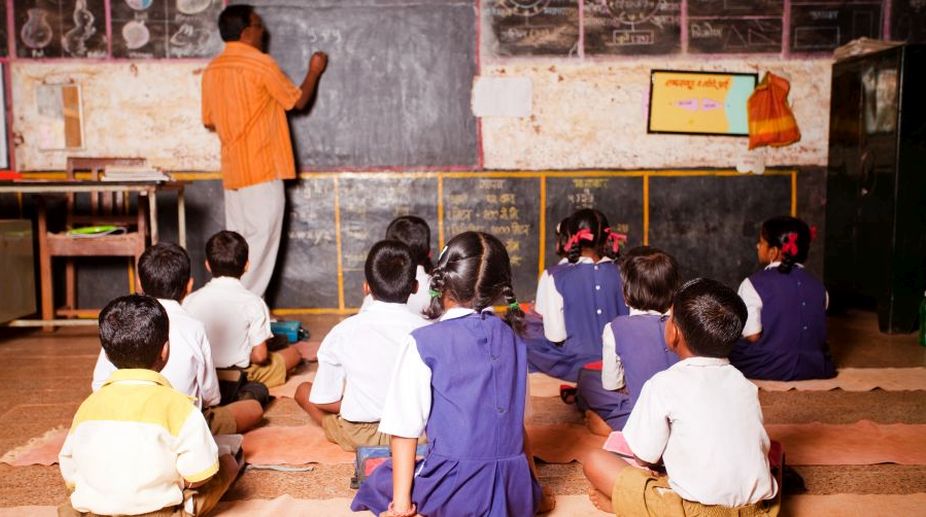In ancient times, an educational institution was meant to be a place of leisure where the inherent divinity and talent of the child was nurtured, leading to the emergence of a fully integrated individual. This was done not only by imparting secular knowledge but also by fostering a spirit of self-enquiry. This meant that a person was to come upon knowledge not only of the outer but also of the inner world of the self, a state of self-knowledge. The only one who lived a life based on self-knowledge would come upon the religious life. But such a situation does not exist in the modern day.
There should be a paradigm shift in the way the world looks at the role of the educator. The teacher must change from being a mere transmitter of knowledge and become a facilitator, creating right conditions for the student to find his own way, allowing the flowering of the integrated and complete individual. This completeness is what is unique to each and every individual. Unless we achieve this completeness, there is a real danger of human beings going over the abyss. This is the challenge of the new millennium.
Advertisement
Teaching is an extraordinarily complex and important job, and societies that have been able to highlight the importance of teachers have made tremendous progress in the last few decades. With 1.5 million schools, 37,204 colleges and 677 universities in India (as per the Ministry of Human Resources and Development Statistics; updated in April 2016), education is a large industry with place for everyone.
Take Finland and Singapore, for example. In both countries, teaching is a highly competitive and prestigious profession, and as a result, these countries have world-class education systems that consistently fuel economic and social progress.
There is a significant body of research that shows just how much teachers matter. In a 2012 study that tracked 2.5 million children over 20 years, three high profile researchers from Columbia University showed that primary and middle school teachers who helped their students improve in mathematics and reading tests had lasting positive effects on those students’ lives and significantly improved their academic, professional, and personal outcomes.
Similarly, a number of studies on teacher impact conducted by Rand, a U.S.-based think-tank, show that when it comes to student performance on reading and mathematics tests, teachers have two to three times the impact of any other school factor. In other words, the quality of the teacher that a child has is significantly more important than other factors such as school infrastructure, facilities, or even school leadership. To put it simply, teachers matter a lot.
Given how complex teaching is, and how much teachers matter, perhaps we need to spend much more time as a society discussing how we recruit, train, develop, inspire, and support teachers over the course of their careers.
Perhaps what we need to do is have an open discussion about the role of teachers in the 21st century. In an age where students can access infinite amounts of information on their phones and laptops, what is the role of a contemporary teacher? Certainly, the 21st-century teacher is not just a transmitter of knowledge. Why do our kids need to memorise vast quantities of information when it’s all there — at the tips of their fingers — on Google?
Today’s teacher needs to do much more than mere “delivery.” She or he needs to help students make sense of information by getting them to analyse, question, critique, synthesise, and apply that information in a range of ways.
Perhaps what our teachers need to do now — our entire education system needs to do now — is begin making a shift away from “delivering” information, towards helping students “understand, analyse, and use information.”
And on an even larger scale, we need to make a shift away from conceiving “knowledge” as the core of a curriculum to conceiving “skills” as the core. While knowledge is what we know, skills are what we can do. And what we need today are graduates who can do things — like read critically, write clearly and persuasively, speak and present well, think analytically, ask good questions, work collaboratively, build good people relationships, and come up with original ideas. Twenty-first century teachers need to focus on teaching skills.
In progressive education circles, teachers are urged to be “guides on the side” instead of “sages on the stage.” Their role is moving rapidly from the expert authority who knows everything (we’ll cede that role to Google) to a wise facilitator who can help students make sense of information and use it skillfully.
Instead of merely relying on one prescribed textbook, teachers are becoming curators of information, drawing from all the resources available online, as well as from books and apps to provide students with a rich range of resources to learn from.
If we want to make progress as a society and give our children the skills and knowledge they need to navigate the 21st century, perhaps it’s time for us to follow in the footsteps of countries like Finland and Singapore; we need to encourage our best and brightest to embark on the most important, interesting, complex and satisfying career path there is — we need to inspire them to become teachers.
The writer is with Eastern Institute for Integrated Learning in Management (EIILM),Kolkata.











